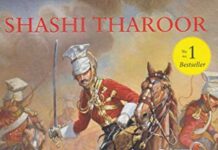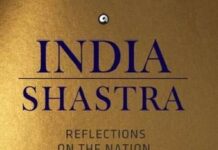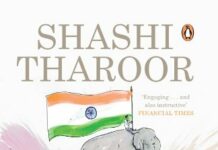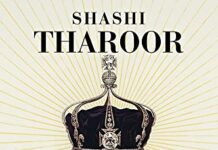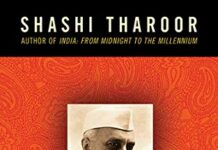
Ebook Info
- Published: 2018
- Number of pages: 310 pages
- Format: PDF
- File Size: 1.08 MB
- Authors: Shashi Tharoor
Description
In Why I Am a Hindu, one of India’s finest public intellectuals gives us a profound book about one of the world’s oldest and greatest religions. Starting with a close examination of his own belief in Hinduism, he ranges far and wide in his study of the faith. He talks about the Great Souls of Hinduism, Adi Shankara, Patanjali, Ramanuja, Swami Vivekananda, Ramakrishna Paramahamsa and many others who made major contributions to the essence of Hinduism. He delves deep into Hinduism’s most important schools of thought (such as the Advaita Vedanta). He explains, in easily accessible language, important aspects and concepts of Hindu philosophy like the Purusharthas and Bhakti, masterfully summarizes the lessons of the Gita and Vivekananda’s ecumenism and explores with sympathy the ‘Hinduism of habit’ practised by ordinary believers. He looks at the myriad manifestations of political Hinduism in the modern era, including violence committed in the name of the faith by right-wing organizations and their adherents. He analyses Hindutva, explains its rise and dwells at length on the philosophy of Deen Dayal Upadhyaya, its most significant ideologue. He is unsparing in his criticism of extremist ‘bhakts’ and unequivocal in his belief that everything that makes India a great and distinctive culture and country will be imperilled if religious ‘fundamentalists’ are allowed to take the upper hand. However, he also makes the point that it is precisely because Hindus form the majority that India has survived as a plural, secular democracy.A book that will be read and debated now and in the future, Why I Am a Hindu is a revelatory and original masterwork.
User’s Reviews
Reviews from Amazon users which were colected at the time this book was published on the website:
⭐In the contemporary Indian society the politicians and media make all the noise but those who really control the discourses are the English speaking urban elite with western style education and probably with a degree from a British or American university. When asked about their religious identity, they typically answer that they are “born Hindu” or “spiritually Hindu” or something vague and noncommittal. They would not be able to explain what Hinduism is or what it means to them to be Hindu, either born or spiritual. In this environment it is refreshing that Sashi Tharoor, a member of this crowd, and a distinguished one for that matter, proudly declares that he is a Hindu and presents his understanding of Hinduism and what it means to him to be a Hindu.Hinduism as we have it today is a collection of belief systems, some call them sampradayas or darshanas, and they are bound together by the core concepts of karma, punarjanmam and mukti. Whether one literally believes in any or all of these, he/she who is consciously a Hindu seeks the truth of these within the tradition to reach mukti as he/she copes with the challenges of day to day living. At the same time he has no problem respecting the paths of others to find their own truth. The book leads me to believe that Sashi Tharoor is one of them and it is to be welcomed.My difficulty with the book is where the author writes about what he calls as “political Hindutva”. Tharoor is currently a member of the parliament by the graces of Indian National Congress whose members prefer to hide their Hindu identity, permit and even encourage the denigration of Hindus and Hinduism by the people of other faiths for gaining political benefits. No wonder that he throws venom on the BJP and RSS. Whether it is a calculated move on his part for his political survival or it is his schizophrenic interpretation of the contemporary Hindu society, he totally misses the religio-social situation in the country and how Hindus have been victimized ever since independence.The constitutional concession to allow the Muslims and Christians (classified as minority) to run their own educational institutions was to guarantee that their way of life will not be disturbed by the majority community and to help them to educate their children about their religious traditions and beliefs in a way acceptable to them. This has been perverted by vote bank politics to mean that Muslims and Christians will have a veto on the national policies and they could run colleges of engineering and medicine with financial support from the government with preference to students of their own faith. The so called secular government has laws that make it difficult for Hindus to run similar educational institutions on equal footing. Hindu temples are managed by state governments run by political parties who are openly anti-Hindu (DMK in Tamil Nadu and Communists in Kerala) and the temple revenues being siphoned off to unrelated causes while the Islamic and Christian worship places are free from governmental interference. The book has been silent on the issue of extensive proselytizing efforts supported by massive financial backing by the American and European Christian organizations.Section I (chapters 1 thru 4) is full of rambling with many misinterpretations, none too severe. Hinduism has an open architecture where everyone is free to interpret the meanings in his/her own way. Section II is full of polemics and spitting venom at RSS, BJP and their leadership. Section III shows the author’s confusion within his own understanding of Hinduism. While he praises Hinduism as a faith suited for 21st century for the reason that it gives him of freedom of interpretation, he denies the same freedom to the other people and he slanders them as “Political Hindutva forces”. It shows the underlyng hypocrisy.
⭐His picture of Hinduism’s tolerance of other beliefs and religions is partially accurate.By and large, Hindus do not kill heretics as some other religions historically did, and some still do. However, social ostracization is common for those who do not toe in line.I am a Hindu but do not believe in idolatry or the caste system.I believe in a decentralized God whose presence can be felt within oneself, in nature, and every living being (Advaita).However, I have no quarrel with those who follow other paths for salvation, so long as they do not create a climate of hatred and enmity.I fully agree with Sashi Tharoor’s criticism of the Hindutva movement, followed by the present Government in power. I want to go further by saying that no Government should have the ability to direct the beliefs of individual citizens so long those beliefs do not cause harm to other citizens or the society in general.No law should be enacted that discriminates against one citizen from another.There should be no mixing of politics with theology, and all citizens should have equal protection under its laws.I would like this book to be translated and published in many Indian languages so that it may be more widely read in India.
⭐”Why I Am a Hindu” was written in the context of growing electoral victories by the Hindu nationalist BJP political party (which claims to represent “real Hinduism” and to speak for a Hindu India rather than the secular pluralism of Gandhi and Nehru) and so written primarily for an Indian audience.I read it for a different reason: There is no end of English-language literature on Hinduism written from one of two perspectives: either erudite, academic analysis or wit a specifically Christian, and usually missionary, view. (There’s a lot of material that amounts to, “How to talk to a Hindu about Jesus” which presumes that Hindus need to be something other than what they are.)I wanted to follow the advice of the late Krister Stendahl of Harvard (in later life the Lutheran Archbishop of Uppsala) who said that if you want to understand a religion, talk to its adherents, not its detractors.Hinduism could not have a more articulate proponent than Dr. Shashi Tharoor, who is Hindu both by birth and conviction and also thoroughly at home in the English-speaking intellectual world. For an American reader, a great strength of this book is precisely that it was not written for a Christian audience–since I am not at all sure that someone from an Abrahamic tradition even CAN really grasp Hinduism, in all of its hospitable plurality and avoidance of sectarian certainty.But if you’re willing to try and engage Hinduism on its own terms–the only approach with any integrity, after all–then this is a wonderfully helpful book, and one worth reading more than once.Non-Indian readers should be willing to skip around, though, since not all sections will be relevant to their interests.
⭐I am a Hindu by birth. It never occurred to me to oppose the practices by people around me. Like I choose what I want to eat in a cafeteria I practised methods the religion the way I felt comfortable with. It affords me the freedom to see God in away,shape and form that provides me freedom of thought and methods. This aspect of Hindu faith makes it appear disorganized and chaotic to the outside observer of life of people living in India regardless of the religious affiliation of people being observed. The authors brings this point out very vividly in this book.
⭐I remember a line from the early days of my reading and it goes like this – ‘If a poet falls in love with you, you will forever be immortalised’. That was the feeling I had when I finished reading this book. On one side are trolls of social media, simply bashing you for any and every point that you express. The validity or otherwise of the point matters the least to them. All that they want is to put you down and insult you. They turn every debate into a bitter argument and leave a bad taste in the mouth. At the other end of the intellectual spectrum are people like Shashi Tharoor. These are the kind of people that you don’t normally mess with, or else they ‘immortalise’ you by writing in reams to prove how dumb you and your opinions are.This book is co-authored by Shashi Tharoor, the intellect, and Shashi Tharoor, the politician. The intellect Shashi Tharoor begins the book beautifully, elaborating on the core tenets of Hinduism and all the things that make Hinduism not just a religion, but the very way of life worth emulating. Briefly delving on the probable origins of Hinduism, the challenges it faced all along its many millennia-old existence, the ways in which it overcame those challenges and the innumerable saints and holy personae that stand as shining beacons for all the virtues that Hinduism is all about. Ironically, Mr. Tharoor makes you feel proud about being Hindu, more than all the antics and assertions of the so-called saviours of the ‘Hindutva’ brigade.The second and final part of the book are used by politician Shashi Tharoor, who uses it as a canvas to paint a poor – many times, correctly so – picture about his political opponents, especially those belonging to the Hindutva brigade. Starting from the patriarchs of RSS, Golwalkar and Savarkar, who used hatred for another religion to fuel the passion for their own, touching upon the somewhat sensible life of Deen Dayal Upadhyay, to the present day leaders of BJP, who rode upon paranoia and hatred of a huge scale to attain their political gains, Shashi Tharoor has ‘immortalised’ everyone with his systematic arguments against their narrow ideologies, setting them against the all-encompassing backdrop of Hinduism.In an age of manipulation through fake-images and messages spread through social media, people have been taught to hate the real soldiers of India’s freedom struggle, forgetting that these ‘Hindutva’ proponents made little or no contribution during the struggle for India’s independence. But Shashi Tharoor is no pushover to let them go easily. His book is a timely and sensible argument against the malady that is ‘Hindutva’, a product of fear and paranoia.Those belonging to Congress will be all praise for this book. Those supporting the BJP will call this book as biased. But any unbiased reader, especially a Hindu who loves his religion, but doesn’t allow that love to become a license to spew paranoia and hatred against practitioners of other religions, will find this book to be a worthy argument. A sensible read!
⭐not good
⭐Tharoor’s grasp of his subject is awesome. Unfortunately 40 per cent of the book is too political and continuous criticism of BJP and of how wrong the BJP is.. Politics does not belong in this book which is otherwise excellent when talking about Hinduism.
⭐A heinous polemic in Hinduism and Hindutva. One can easily be confused whether Tharoor’s objective was to praise Hinduism or to spew venom on BJP.Skip it!
⭐It’s really tharoorus!
Keywords
Free Download Why I am a Hindu in PDF format
Why I am a Hindu PDF Free Download
Download Why I am a Hindu 2018 PDF Free
Why I am a Hindu 2018 PDF Free Download
Download Why I am a Hindu PDF
Free Download Ebook Why I am a Hindu
